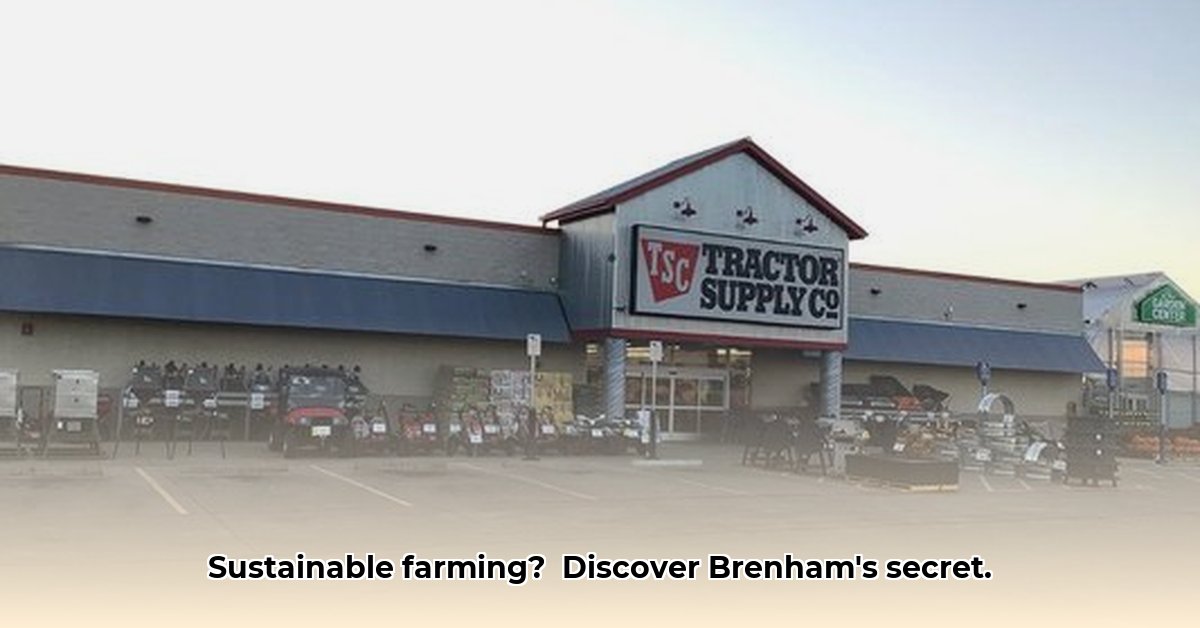
Brenham Tractor Supply (BTS) occupies a unique position in the local agricultural landscape. While offering a range of products that could support sustainable farming practices, the extent of its actual contribution remains unclear. This investigation explores BTS's role in promoting sustainable agriculture in Brenham, Texas, examining both its potential and its limitations. We delve into the products offered, gather perspectives from local farmers and experts, and analyze the challenges and opportunities presented by the current situation. Ultimately, we aim to understand how BTS can better support the transition to a more environmentally responsible agricultural future. For more on small farm equipment, see this resource.
What Brenham Tractor Supply Offers – and What's Missing
BTS stocks various items potentially beneficial for sustainable agriculture, including water troughs, durable fencing suitable for rotational grazing, and a selection of seeds. However, critical information is lacking. The origin of these products, their environmental impact from production to shelf, and the availability of organic or biodynamic alternatives remain undisclosed. This lack of transparency significantly hinders an objective evaluation of BTS's contribution to sustainable agriculture in Brenham. Without detailed information about their entire supply chain, it's challenging to assess their genuine commitment. Isn't transparency crucial for a company aiming to promote sustainability?
A Brenham Perspective: Tailoring Solutions to Local Needs
Brenham's unique climate and established farming practices necessitate specific sustainable solutions. This presents a significant opportunity for BTS. Imagine if BTS collaborated with local farmers and suppliers to offer products tailored to Brenham’s specific needs. This would not only enhance the accessibility of sustainable options but also boost the local economy, creating a mutually beneficial outcome. Such a localized approach could be a powerful driver of change and significantly improve its impact on sustainable farming.
Challenges and Opportunities: Navigating the Path to Sustainability
BTS faces several key challenges. Its reliance on conventional farming supplies, which may not always align with environmentally friendly practices, is a significant concern. The lack of detailed supply chain information presents another hurdle in assessing their overall environmental impact. Finally, many Brenham residents may be unaware of the available sustainable alternatives.
However, these challenges also highlight crucial opportunities. By addressing the lack of transparency, actively sourcing more sustainable products, and educating consumers, BTS can significantly enhance its role in promoting environmentally responsible agriculture. This requires proactive steps focused on both supply chain improvements and consumer engagement.
Moving Forward: A Collaborative Approach to Sustainable Agriculture
The transition to more sustainable agricultural practices in Brenham demands a coordinated effort from multiple stakeholders:
Brenham Tractor Supply: BTS must conduct a thorough environmental impact assessment of its product lines, actively seek and source more eco-friendly options, and collaborate with local farmers to identify their specific needs. Transparent reporting of progress toward specific, measurable sustainability goals is crucial for building trust in their commitment.
Local Farmers: Farmers should actively explore and utilize the available sustainable products and openly communicate their requirements to BTS, fostering a feedback loop that guides product selection and availability. Their practical experience is invaluable in shaping effective sustainability strategies.
Consumers: Consumers should actively seek out and purchase sustainable products whenever possible, thereby influencing market demand and encouraging BTS to expand its eco-friendly offerings. Their purchasing power is a tangible way to express their values and support businesses committed to sustainability.
Government and NGOs: Regulatory bodies and non-governmental organizations have a vital role in establishing clear standards for sustainable agriculture, providing educational resources, and offering financial incentives to encourage the adoption of eco-friendly practices. Their support is key to fostering an environment that incentivizes sustainable choices.
Risk Mitigation: A Proactive Approach
Several risks hinder the adoption of sustainable practices. Addressing these proactively is vital:
| Risk Factor | Mitigation Strategy |
|---|---|
| Reliance on conventional supplies | Gradually transition to organic and biodynamic products; actively promote eco-friendly alternatives. |
| Unclear product origins | Implement detailed supply chain traceability; prioritize ethically sourced products. |
| Low consumer awareness | Launch targeted educational campaigns; clearly highlight eco-friendly options in-store and online. |
| Climate change impact on crop yields | Promote drought-resistant seeds and implement water-efficient irrigation techniques. |
Beyond Brenham: A Broader Perspective
The scope of this investigation is limited by the currently available information. A more comprehensive understanding requires further research, such as a detailed life-cycle assessment of various animal feeds and a thorough analysis of water usage across diverse irrigation systems. Only through such extensive data collection and analysis can we fully grasp the extent of BTS's contribution to the local sustainable agriculture landscape. The future of sustainable agriculture in Brenham hinges on cooperation and transparency among all involved.
Enhancing Sustainability Initiatives: A Call to Action
The success of BTS's sustainability efforts depends on a commitment to transparency, collaboration, and accountability. Specific, measurable goals, regular reporting of progress, and third-party verification are essential for building trust and demonstrating genuine commitment to sustainable agriculture. Only through a collaborative, data-driven approach can a truly positive and meaningful shift occur. The future of sustainable agriculture in Brenham, and beyond, depends on it.